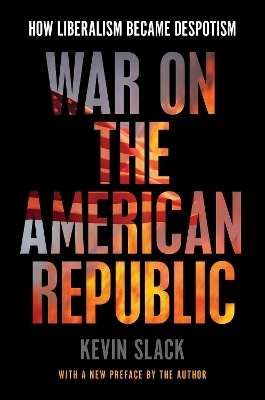
War on the American Republic
How Liberalism Became Despotism
Seiten
2024
Encounter Books,USA (Verlag)
978-1-64177-417-8 (ISBN)
Encounter Books,USA (Verlag)
978-1-64177-417-8 (ISBN)
Kevin Slack sounds the alarm on how America's failed neoliberal regime has given way to a woke oligarchy that has deployed a radical toolkit to rapidly strip away the rights of citizens.
Americans often use the wordsprogressive,liberal, andradicalmore or less interchangeably without understanding their place in American history. Kevin Slack describes the distinct aims of the movements they represent and weighs their consequences for the American republic.
Each of the three movements rejected older republican principles of governance in favor of an administrative state, but there were substantial differences between Teddy Roosevelt's Anglo-Protestant progressive social gospelers, who battled trusts and curbed immigration; Franklin Roosevelt's and Lyndon Johnson's secular liberals, who forged a government-business partnership and promoted a civil rights agenda; and the 1960s radicals, who protested corporate influence in the Great Society, liberal hypocrisy on race and gender, and the war in Vietnam. Each sought to overturn what came before.
Following the revolution of the 1960s, elites on both left and right turned against the industrial middle class to erect an oligarchy at home and advance globalization abroad. Each side claimed to serve the interests of disadvantaged or underrepresented groups. Radicals ensconced themselves in bureaucracy and academia to advance their vision of social justice for women and minorities, while neoliberal elites promoted monopoly finance, open borders, and the outsourcing of jobs to benefit consumers. The administrative state became a global American empire, but the neoliberals' economic and military failures precipitated a crisis of legitimacy. In the "great awokening" that began under Barack Obama, neoliberal elites, including establishment conservatives, openly broke with the populist base of the Republican Party, embraced identity politics, and used COVID-19 and a myth of insurrection to strip away the rights of American citizens.
Today, an incompetent kleptocracy is draining the wealthiest and most powerful people in history, thus eroding the foundations of its own empire.
Americans often use the wordsprogressive,liberal, andradicalmore or less interchangeably without understanding their place in American history. Kevin Slack describes the distinct aims of the movements they represent and weighs their consequences for the American republic.
Each of the three movements rejected older republican principles of governance in favor of an administrative state, but there were substantial differences between Teddy Roosevelt's Anglo-Protestant progressive social gospelers, who battled trusts and curbed immigration; Franklin Roosevelt's and Lyndon Johnson's secular liberals, who forged a government-business partnership and promoted a civil rights agenda; and the 1960s radicals, who protested corporate influence in the Great Society, liberal hypocrisy on race and gender, and the war in Vietnam. Each sought to overturn what came before.
Following the revolution of the 1960s, elites on both left and right turned against the industrial middle class to erect an oligarchy at home and advance globalization abroad. Each side claimed to serve the interests of disadvantaged or underrepresented groups. Radicals ensconced themselves in bureaucracy and academia to advance their vision of social justice for women and minorities, while neoliberal elites promoted monopoly finance, open borders, and the outsourcing of jobs to benefit consumers. The administrative state became a global American empire, but the neoliberals' economic and military failures precipitated a crisis of legitimacy. In the "great awokening" that began under Barack Obama, neoliberal elites, including establishment conservatives, openly broke with the populist base of the Republican Party, embraced identity politics, and used COVID-19 and a myth of insurrection to strip away the rights of American citizens.
Today, an incompetent kleptocracy is draining the wealthiest and most powerful people in history, thus eroding the foundations of its own empire.
Kevin Slackis a professor of politics at Hillsdale College, where he teaches political philosophy and American political thought, including American progressivism, liberalism, and radicalism. His first book,Benjamin Franklin,Natural Right, and the Art of Virtue, was published by the University of Rochester Press. His scholarly articles have appeared in journals such asAmerican Political Thought,New England Quarterly,Pennsylvania Magazine of History and Biography,Church History, andAmerican Thinker. Dr. Slack earned his PhD from the University of Dallas in 2009.
| Erscheinungsdatum | 28.08.2024 |
|---|---|
| Zusatzinfo | Illustrations |
| Verlagsort | New York |
| Sprache | englisch |
| Maße | 152 x 228 mm |
| Themenwelt | Geisteswissenschaften ► Geschichte ► Regional- / Ländergeschichte |
| Geschichte ► Teilgebiete der Geschichte ► Kulturgeschichte | |
| Geisteswissenschaften ► Philosophie | |
| Sozialwissenschaften ► Politik / Verwaltung ► Politische Systeme | |
| Sozialwissenschaften ► Politik / Verwaltung ► Politische Theorie | |
| ISBN-10 | 1-64177-417-7 / 1641774177 |
| ISBN-13 | 978-1-64177-417-8 / 9781641774178 |
| Zustand | Neuware |
| Haben Sie eine Frage zum Produkt? |
Mehr entdecken
aus dem Bereich
aus dem Bereich
der stille Abschied vom bäuerlichen Leben in Deutschland
Buch | Hardcover (2023)
C.H.Beck (Verlag)
23,00 €
vom Mittelalter bis zur Gegenwart
Buch | Softcover (2024)
C.H.Beck (Verlag)
12,00 €


